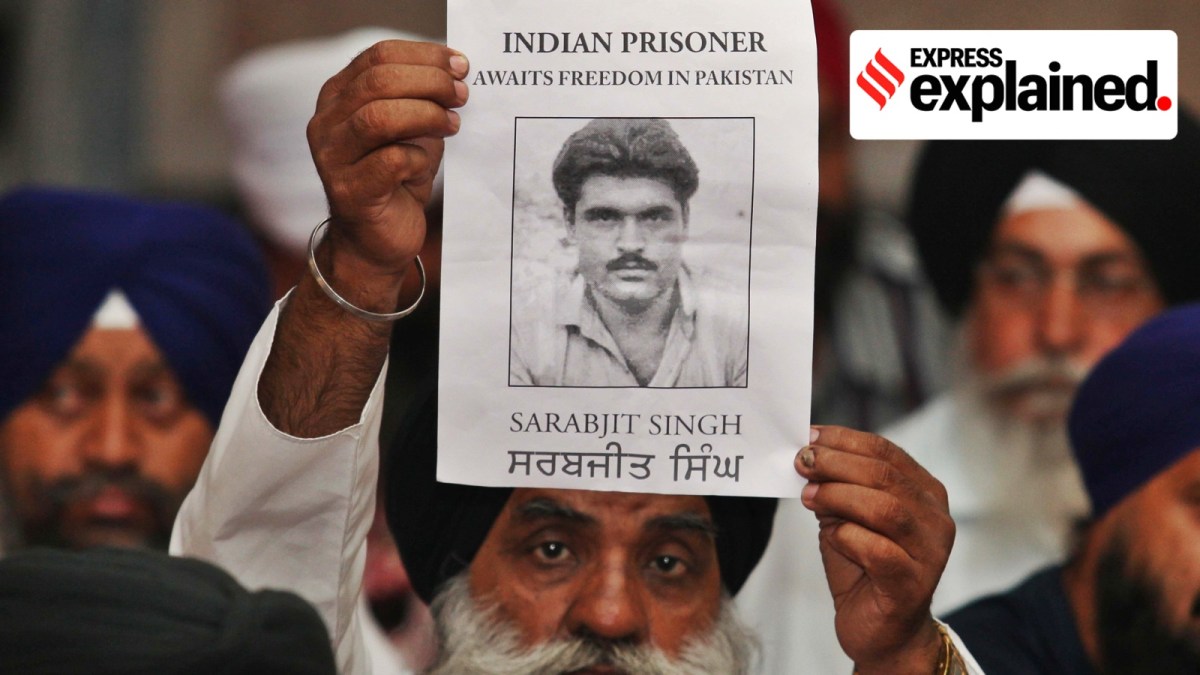Pakistan man accused in Sarabjit Singh killing shot dead: What was the case?
Indian national Sarabjit Singh’s imprisonment in Pakistan, and his subsequent death in a 2013 attack in a Lahore jail, was a significant diplomatic issue between India and Pakistan at the time.

A Pakistani man who was alleged to have killed Sarabjit Singh, an Indian death row prisoner in Pakistan, was shot dead by unidentified assailants in Lahore on Sunday (April 14).
The deputy inspector general of police in Lahore told Associated Press that gunmen entered Tamba’s house and shot him. They fled the scene on a motorbike, following which Tamba was taken to a hospital.
Who was Sarabjit Singh?
Hailing from Bhikhiwind, a town in Punjab’s Tarn Taran district, Singh was an Indian. His family stated that he was a farmer who crossed the India-Pakistan border in an inebriated condition 23 years ago.
The Pakistan Army arrested him in 1990, initially over charges related to illegally crossing the international border. However, it later alleged that he was an Indian spy whose real name was Manjit Singh. He was charged with plotting a series of bomb blasts in 1989 in Lahore and Multan that killed 14 people.
According to a PTI report, his sister Dalbir Kaur said she received a letter from him in 1991, one year after he was jailed, stating that the Lahore police had framed him. Singh was later awarded the death penalty in Pakistan. His trial was based on a confessional statement which the Pakistani authorities claim he gave during the course of the investigation.
However, the Indian government and several rights groups raised concern over possible torture and unfair trial.
In 2006, the Supreme Court of Pakistan dismissed Singh’s petition against the sentence. Lodged in Lahore’s Kot Lakhpat Jail, Singh was to be hanged April 1, 2008. However, the authorities put this off after the then Prime Minister Yousuf Raza Gilani sought to examine the issue, following clemency appeals from India.
His relatives from India were allowed to visit him twice between 1991 and 2013.
How was Sarabjit Singh killed?
On April 26, 2013, a few other men lodged in the Lahore jail attacked Singh. He was hospitalised and succumbed to his injuries on the night of May 2, 2013, at the age of 49. The cause for the attack was unclear.
Pakistani local police authorities registered an FIR against prisoners Tamba and Mudassar following a complaint from the jail’s Assistant Superintendent.
In 2018, a Pakistani court acquitted the two suspects, citing “lack of evidence” against them. According to a court official, all witnesses turned hostile.
What was the reaction in India and Pakistan?
Then Indian Prime Minister Manmohan Singh described Sarabjit’s death as “very sad”. He called him a “brave son of India who bore his tribulations with valiant fortitude” and said it was “particularly regrettable” that Pakistan did not heed pleas to take a humanitarian view of his case.
The PM announced an ex-gratia of Rs 25 lakh for the family. The state government of Punjab announced financial assistance of Rs 1 crore and declared state mourning for three days. Additionally, it announced government jobs for Sarabjit’s daughters, Swapandeep Kaur, and Poonam.
Then External Affairs Minister Salman Khurshid said, “For the present, I can only say that it is a terrible psychological and emotional setback to all of us and, I believe, to what we have been trying to do in terms of creating greater cohesion between people of India and people of Pakistan.”
The Human Rights Commission of Pakistan (HRCP) demanded action against all those who played a part in the assault at the time. Then HRCP chairperson Zohra Yusuf said in a statement: “Not even the most naive person can believe that a prisoner like Sarabjit in a death cell inside a jail can be targeted in such a brutal assault by prisoners without the knowledge and support of prison guards and the authorities.”
It added, “Those in Pakistan who take pride in their vengefulness must feel some shame today, if they are capable of that. Those elements in India who are no less vengeful, intolerant and fond of jingoism than their Pakistani counterparts would no doubt write their own script now.”